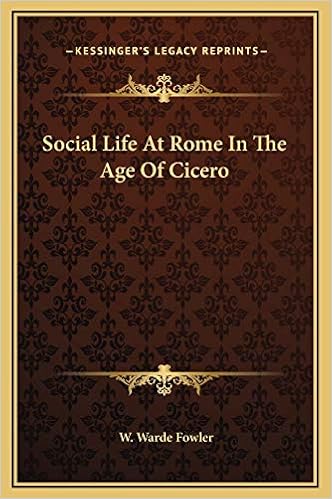Fowler's book itself doesn't start off very well. He tries to lay the groundwork for his study by describing the physical geography of Rome as a city. He essentially walks its streets in prose, telling us where this and that thing is. That sounds more interesting then it really is. I felt as if I'd have gotten a better sense of the city's layout by looking at a map. Missing from that description is much of a sense of how those streets actually would have felt at the time, which would have been a larger reason for providing such a long description.
However, after that first chapter, the book becomes markedly more interesting, as Fowler becomes more invested in the subject of the actual work--the social life of people living in Rome. There are chapters on the lower class, the business class, and the aristoricracy; chapters on women, slaves, and family life; a chapter on education and a couple chapters about the lives of the well-to-do. Finally, he closes with chapters on religion and festivals.
What he does well in these chapters is show how the life of the Romans was changing--and also why that change was occuring. His book does this better than many others books I've read by giving readers a clear sense of why such changes were occurring and by making comparisons to Britain in the 1900s, when he was himself writing. Of course, his views regarding why such changes were occurring are weighted in his own perspective, but such still makes one feel as if one understands what's happening more than just being told that there were more immigrants or there was an increasing amount of entertainment. Fowler gives readers a sense that Rome was a society in moral decline, and that that decline is part of what enabled a number of social changes as well as a change to the system of government.
War had led Romans to feel less of a connection to the gods. As philosophy (most especially Epicureanism) replaced religion at the core of elite thinking, a certain kind of wayward lifestyle took hold, as well as lesser concern for the state as opposed to the individual (the reason the republic eventually folded), such that population began to decline. To make up for the loss of labor, slaves were imported, then given more and more power; as such, foreign elements made up more and more of the population. The import of foreign slaves, as well as the inadequacies of philosophy, led to the import also of foreign religions--new gods. In addition, Stoic philosophy managed to merge religious concerns with philosophy such that it became more popular as the age of Cicero came to an end. As such, religion also made its recovery, as the age of the emperor took hold.







No comments:
Post a Comment